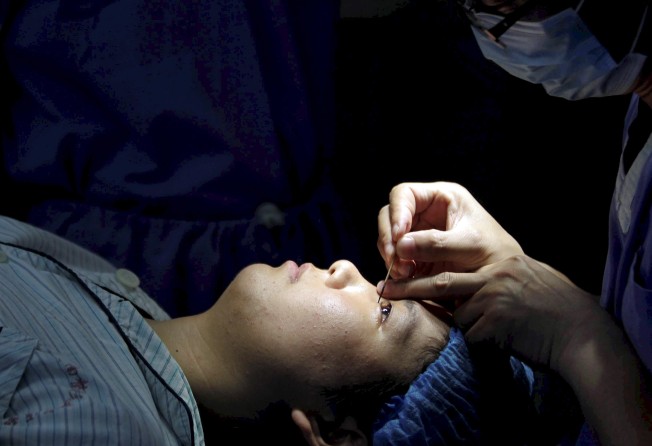Coronavirus restrictions can’t stop Japan’s demand for plastic surgery. But is it safe?
- Some patients see the pandemic as the perfect time for cosmetic surgery, knowing their face masks will cover the swelling following an operation
- There are safety concerns, however, as clinics are struggling to acquire materials used during surgery, such as gauzes and disinfectants

In Japan, the coronavirus pandemic has led to school closures and people working from home, but some people have decided it is a good time to try something they have always wanted: plastic surgery.
This has worried many medical professionals who have asked people to “refrain from non-essential treatments” to prevent further spread of the virus, as the number of cosmetic surgery applications in Japan has recently increased.
However, demand shows no sign of easing, largely due to the prevalent use of face masks to prevent infection which can be also used to hide potential post-surgery swelling.
“There are many people who want eye surgery or face lifts,” said a female nurse, 23, who works at a major clinic. “Some parents and children come together to get double eyelid surgeries.”
The clinic tends to receive more reservations from the end of January, when universities take a two-month break at the end of the academic year, but has had more bookings than usual this year, she said.
As medical facilities nationwide face a shortage of supplies due to the pandemic, the clinic has struggled to secure materials such as sterilised gauzes and disinfectant.
The nurse said it has decreased the number of gauzes used in surgery from 10 to between two and five, and on occasion cuts a piece of gauze in half due to lack of supplies.
“We cannot be said to be in perfect condition [from a hygienic perspective],” she said.
A 29-year-old female nurse quit her job at a clinic in Tokyo at the end of April, citing anxiety about potential infections and distrust toward its management.
Although its website says the clinic ensures patients’ safety by disinfecting its facilities, it lacked disinfectants and did not sterilise them properly recently, she said.
Furthermore, employees at the clinic have their salary cut by over 10,000 yen (US$93) for a day off, making it difficult for workers with a fever to stay home, she said.
According to the nurse, the clinic closed when a staff member was found to have coronavirus, but reopened after a few days without announcing the infection.
“I was embarrassed to work at a place that may be spreading the virus,” she said. “They should temporarily stop people from coming.”
The Japan Association of Aesthetic Medicine and the Japan Society of Aesthetic Plastic Surgery state on their websites that cosmetic treatments are “not essential for many people”.
“Health care professionals should be working on securing medical resources as well as preventing further spread of the virus. Please refrain from surgery at this time,” said Hiroyuki Ojimi, president of the JSAPS.